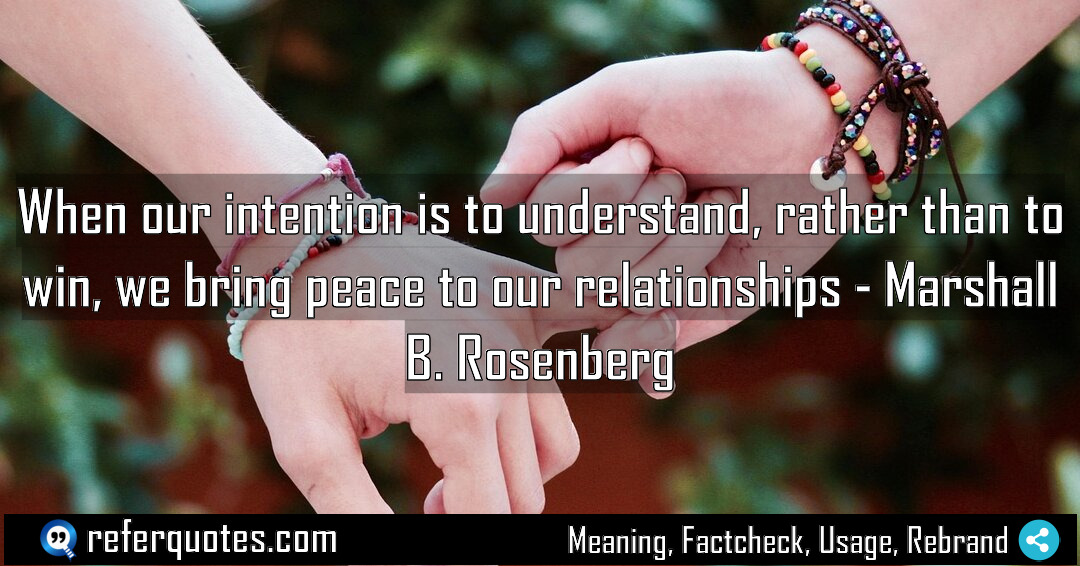
When our intention is to understand, rather than to win, we completely shift the dynamic of any conversation. It’s the difference between a battle and a collaboration, and honestly, it’s a game-changer for relationships.
Share Image Quote:
Table of Contents
Meaning
The core message is simple but profound: shift your goal from victory to comprehension, and conflict naturally dissolves into connection.
Explanation
Let me break this down from my own experience. We’re hardwired to defend our position, right? To prove we’re right. But Rosenberg is pointing out that this “winning” mindset is a trap. It turns the other person into an opponent. When you genuinely try to understand their feelings and needs—what’s *alive* in them—you’re no longer on opposite sides of a battlefield. You’re two people trying to solve a puzzle together. The “peace” he talks about isn’t just the absence of yelling; it’s this palpable, positive shift where both people feel heard and valued.
Quote Summary
Reading Level68
Aesthetic Score89
Origin & Factcheck
This quote comes directly from Marshall B. Rosenberg’s 2005 book, Raising Children Compassionately, which is part of his broader work on Nonviolent Communication (NVC). It’s a cornerstone of his methodology, developed over decades, primarily in the United States. You won’t find it correctly attributed to anyone else.
Attribution Summary
Where is this quotation located?
| Quotation | When our intention is to understand, rather than to win, we bring peace to our relationships |
| Book Details | Publication Year/Date: 2004; ISBN/Unique Identifier: 9781892005140; Last edition: PuddleDancer Press, 1st Edition, 48 pages. |
| Where is it? | Chapter: From Conflict to Connection, Approximate page from 2004 edition |
Context
While the book’s title focuses on parenting, the principle is universal. Rosenberg placed it there because parent-child conflicts are such a raw, high-stakes training ground. If you can apply this with a screaming toddler or a defiant teenager, you can apply it anywhere—with your partner, your colleagues, anyone.
Usage Examples
Here’s how this looks in the real world:
- In a Heated Debate with Your Partner: Instead of rehashing who did what, you might say, “Help me understand why this is so important to you.” This simple question moves you from adversaries to allies.
- Managing a Frustrated Employee: Rather than just defending a company policy, a manager could say, “I see this is really frustrating for you. Talk to me about the specific hurdle you’re facing.” It de-escalates immediately.
- Audiences for this? Honestly, everyone. Leaders, parents, teachers, couples… anyone who has to talk to other human beings.
To whom it appeals?
Share This Quote Image & Motivate
Motivation Score82
Popularity Score86
Shareability Score89
FAQ
Question: But what if the other person is clearly wrong?
Answer: That’s the hardest part! The goal isn’t to agree with them, it’s to understand their perspective. Once they feel understood, they become infinitely more receptive to hearing your side. It’s counter-intuitive, but it works.
Question: Does this mean I should never state my own needs?
Answer: Not at all. In fact, it’s the opposite. NVC is a two-way street. You seek to understand their needs *so that* you can then also express your own in a way that can be heard. It creates a space for mutual respect.
Question: Is this just about being passive and avoiding conflict?
Answer: Absolutely not. This is an active and incredibly courageous way to engage. It takes strength to set aside your own agenda to truly listen. It’s about transforming conflict, not avoiding it.
Similar Quotes
When we cease to resist what is, we unlock a profound shift. It’s not about giving up, but about giving in to reality. This simple act is where true, natural…
Every time we listen without judgment, we teach peace. It’s a profound shift from just hearing words to truly understanding the human behind them. This simple act transforms communication and…
Every act of understanding is a step toward peace. It’s a simple but profound truth that transforms family dynamics. When you truly listen, you de-escalate conflict and build real connection.…
You know, I’ve been thinking a lot about that Dale Carnegie idea: “The goal is not to win every argument…” It’s a game-changer. It flips the entire script on why…
You know, when Marshall Rosenberg said “Peace begins in the way we speak,” he wasn’t just talking geopolitics. He was pointing to the micro-level, the very foundation of our relationships.…
